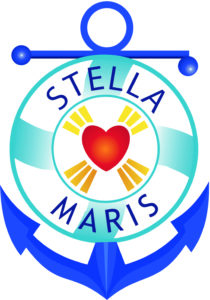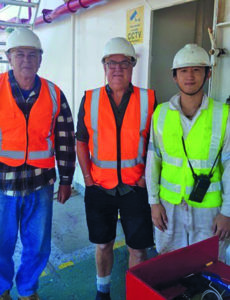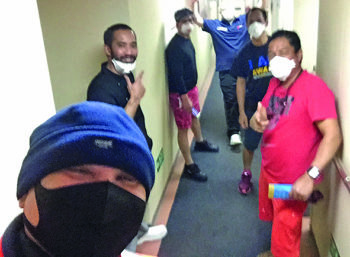Sea Sunday – 12 July

By Fr Jeffrey Drane SM

The maritime industry provides us with our food, clothing, health and education needs and virtually all our consumer goods. The industry has changed massively since Sea Sunday last year. Changes have been in response to fluctuations in international economies and the effects of the global pandemic.
The global Catholic services to seafarers and fishers, called Stella Maris, has had to change significantly to respond in more resilient ways. Australian and New Zealand faith-based organisations like Stella Maris have been working to face the troubles arising from these changes. The focus has been on the exploitation and disruption caused for seafarers and their families and communities back home. The recent pandemic and its significant fallouts on the world trade and logistics served to accelerate what had already begun within the industry from slow economic recession.

Napier Stella Maris ship visitors,
(left) Ben Revell and Mike Eagle
Most noticeable this last year has been the increased exploitation and abuse of seafarers in the expanding cruise industry. The large numbers involved make detection more difficult. But we did notice feeble interest by ownership and port authorities in providing seafarers Wi-Fi access to families or granting shore leave, and in allowing adequate rest or safer workplaces. Pushing hours of work at minimal cost to maximise profit is the age-old problem of being part of a workforce like this. As well, there is no one particular set of laws or standards and policing is a real problem when ships are outside territorial waters.
Even though it is slightly easier for Stella Maris volunteers to advocate against illegal employment practices, it is much harder to detect neglect of seafarer wellbeing. Detection is especially tricky with mental health, workplace conflict or disregard for human dignity when in stressful conditions at sea. Health and safety failures are far from reducing significantly despite the mandates behind international laws or reduction in the actual numbers of seafarers and fishers due to automation.
The more significant framework into which this picture fits is the ever-faster changing economic and political scene going on globally. The effects of Covid-19 will not slow it but will speed it up. The silent growth of Artificial Intelligence [AI] will lead to ships without people. It is not far away. Neither are ports without wharfies or national transport systems to ports without drivers or staff. In this bigger framework seafarers and fishers from more impoverished developing societies fear the loss of an opportunity for work and are pressured by their families to retain employment at all costs. Understandably, suicide rates are increasing, even if officially categorised as accidents onboard or overboard. The British Sailors Society in England has offered programmes for wellness.
In these increasingly complex and duplicitous times, faith-based organisations across the South West Pacific have met together more frequently. The most recent meeting was an international conference in Wellington last March, with the regional Maritime authorities - Australian Maritime Safety Authority and Maritime New Zealand - along with members of the International Transport Federation - the union for seafarers and fishers - with port authorities and pilots, with mayors and local authorities in port cities.

Wellington ship visitor, Romeo Apache
(foreground) in the era of Covid-19
We continue to build friendships to work more collaboratively to achieve more effective outcomes and maintain our ongoing education to understand what is genuinely taking place. The global movement of cooperating, known as Port Welfare Committees (PWCs) aims to build a network of relationships with all PWCs regionally and internationally.
Multi-sectorial networks such as this are all the fashion around the world this century to eliminate using people under duress in ways that the majority of us would consider unfair. How these things occur in the maritime industry is hidden and varied, but it brings extreme misery to many people. It happens because too many of us do not know what is happening.
A tough life is precisely the way it is for the 1.6 million seafarers globally. We enjoy the goods and services they bring us all our waking hours, but we do not know what some suffer for us to do so.

 Entries(RSS)
Entries(RSS)